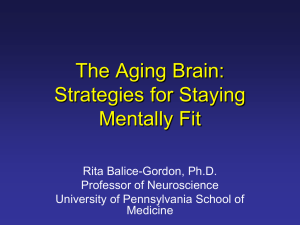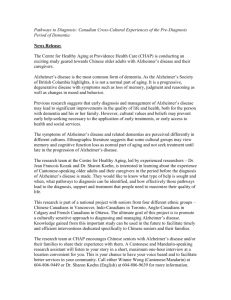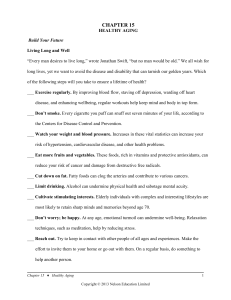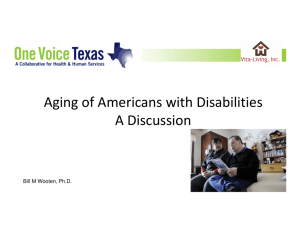Aging Relatives
advertisement
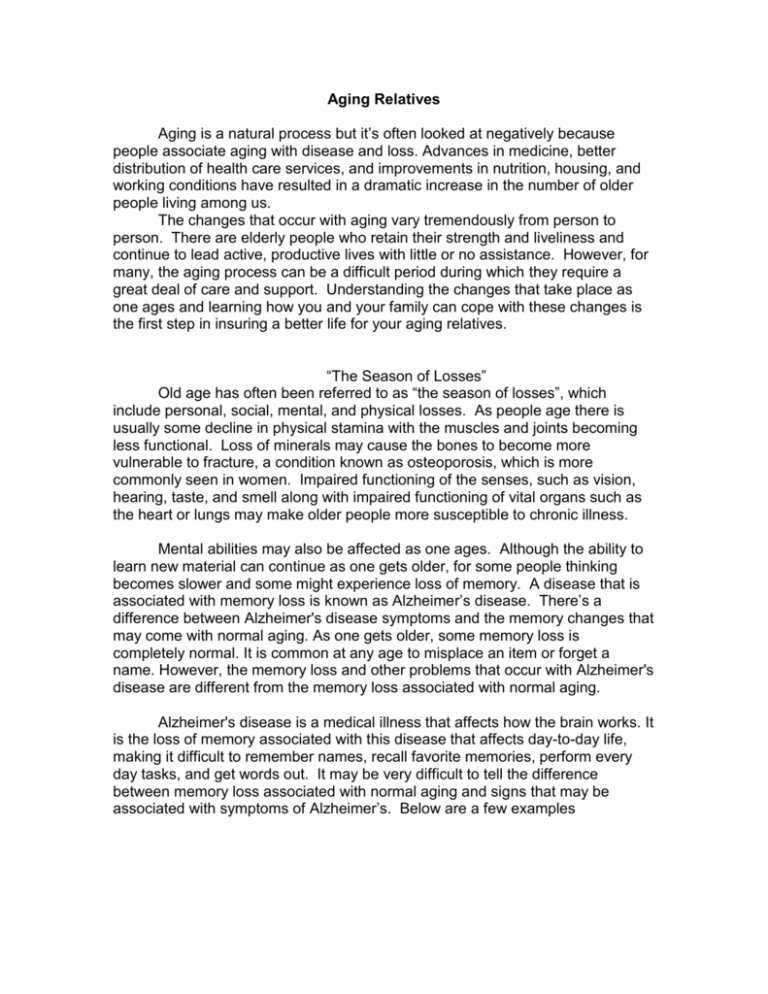
Aging Relatives Aging is a natural process but it’s often looked at negatively because people associate aging with disease and loss. Advances in medicine, better distribution of health care services, and improvements in nutrition, housing, and working conditions have resulted in a dramatic increase in the number of older people living among us. The changes that occur with aging vary tremendously from person to person. There are elderly people who retain their strength and liveliness and continue to lead active, productive lives with little or no assistance. However, for many, the aging process can be a difficult period during which they require a great deal of care and support. Understanding the changes that take place as one ages and learning how you and your family can cope with these changes is the first step in insuring a better life for your aging relatives. “The Season of Losses” Old age has often been referred to as “the season of losses”, which include personal, social, mental, and physical losses. As people age there is usually some decline in physical stamina with the muscles and joints becoming less functional. Loss of minerals may cause the bones to become more vulnerable to fracture, a condition known as osteoporosis, which is more commonly seen in women. Impaired functioning of the senses, such as vision, hearing, taste, and smell along with impaired functioning of vital organs such as the heart or lungs may make older people more susceptible to chronic illness. Mental abilities may also be affected as one ages. Although the ability to learn new material can continue as one gets older, for some people thinking becomes slower and some might experience loss of memory. A disease that is associated with memory loss is known as Alzheimer’s disease. There’s a difference between Alzheimer's disease symptoms and the memory changes that may come with normal aging. As one gets older, some memory loss is completely normal. It is common at any age to misplace an item or forget a name. However, the memory loss and other problems that occur with Alzheimer's disease are different from the memory loss associated with normal aging. Alzheimer's disease is a medical illness that affects how the brain works. It is the loss of memory associated with this disease that affects day-to-day life, making it difficult to remember names, recall favorite memories, perform every day tasks, and get words out. It may be very difficult to tell the difference between memory loss associated with normal aging and signs that may be associated with symptoms of Alzheimer’s. Below are a few examples Normal Aging Possibly Alzheimer’s Periodic Forgetfulness Forgetting where car keys were placed Forgetting a family member’s or friend’s birthday Occasional misplacing of items Interference with daily functioning due to increasing problems with short-term memory Forgetting what car keys are used for Difficulty recognizing family and friends Putting items in unusual places. (e.g., Placing the iron in the refrigerator Other changes that might be present with Alzheimer’s are the inability to exercise good judgment with regard to finances, investments, and money matters, greater dependency on others; forgetting how to do common activities such as cooking, making repairs, or balancing a checkbook; and loss of interest in hobbies or friends. Physical and Emotional Well-Being Good health is an important key to living a rich and rewarding life in later years. To maintain the health and functioning of older adults, regular medical examinations, good nutrition, physical activity, social and recreational activities, and sexuality are important components. Medical prevention, regular checkups, and prompt treatment play a key role in one’s quality of life as a person ages. To maximize the odds of living a longer, high-quality life, preventive health screening, including blood pressure checks, cholesterol screening, colorectal cancer screening, hearing and vision tests, and dental examinations are beneficial. Nutrition. As you get older, good nutrition plays an increasingly important role in how well you age. Eating a low-salt, low-fat diet with plenty of fruits, vegetables, and fiber can actually reduce age-related risks of heart disease, diabetes, stroke, osteoporosis, and other chronic diseases. However, older people tend to be less likely to eat a balanced diet. If one lives alone, there is usually less of an incentive to prepare meals and rising costs might make it difficult for those on fixed incomes to afford the proper foods. Another factor that might lead to poor eating habits and inadequate nourishment is impairment of the senses, taste and smell, or a depressed mood. Physical Activity. Regular physical activity contributes greatly to the fitness, health, functioning, and quality of life of older adults. Exercise can be beneficial in maintaining muscle, joint, circulation, and heart function and in relieving emotional tensions. On a daily basis, being physically active improves your quality of life by improving your: Energy level. Mental sharpness. Mood (regular aerobic exercise helps to manage depression, anxiety, and stress). Balance, strength, and flexibility, which are key to preventing injuries and falls. Immunity to infection. Protection against chronic illness. Physical activity also often helps manage chronic illness with fewer medications. Before beginning any exercise program, one’s physician should be contacted to obtain approval. Social and Recreational Activities. In order for one to enjoy a healthy old age, it’s important to be around other people. Whether physically healthy or ill, people who feel connected to others are more likely to thrive than those who are socially isolated. Sexuality. Although many people think of old age as a sexless period of life, the sexual and emotional needs of people continue as one ages. While the intimacy and warmth of a close relationship is vital to well-being all through life, the need for companionship and the satisfactions of such a relationship are perhaps even greater for an older person, especially those who have suffered many losses. Possible Physical and Emotional Illnesses in Elderly Individuals The physical degeneration that accompanies aging can affect any aspect of bodily functioning. Physical problems frequently encountered in the elderly include: - Sensory deficits, especially diminished hearing or vision. - Degenerative diseases such as arthritis. - Skin problems, such as dryness, itching, inflammation, allergic reactions, skin cancers, and rashes. - Osteoporosis. If untreated, it can progress to curvature in the spine, the development of a hunchback, and an increased tendency to break bones. - Cancer, diabetes, Parkinson’s disease, or arteriosclerosis (hardening of the arteries, which may result in hypertension, heart disease, or stroke). Since the older person frequently experiences many distressing situations, such as the loss of loved ones, decreased self-esteem, loss of independence, fear of physical and mental decline, and/or fear of helplessness and abandonment, the vulnerability to emotional problems is increased. Two common emotional disorders are anxiety and depression. Anxiety occurs when people are faced with more stress than they can deal with. Although some amount of anxiety is natural and unavoidable, it becomes a problem when it interferes with life functioning. Signs that excessive anxiety may be present in the older person include: - Irritability and tension. - Insomnia. - Loss of appetite. - Restlessness. - Frequent headaches. - Excessive concern about a physical ailment Although depression is a common illness among people of all ages, depression in older people has increased in frequency over the past few decades. However, this does not make depression a part of normal aging and it should be taken seriously. Symptoms one can look for include: - Loss of interest in formerly pleasurable activities. - Dissatisfaction with life. - Withdrawal from social activities. - Loss of energy. - Feeling useless or hopeless. - Irritability. - Great concern with health problems. - Self-criticism. - Difficulty concentrating and/or making decisions. - Loss of appetite and weight.

